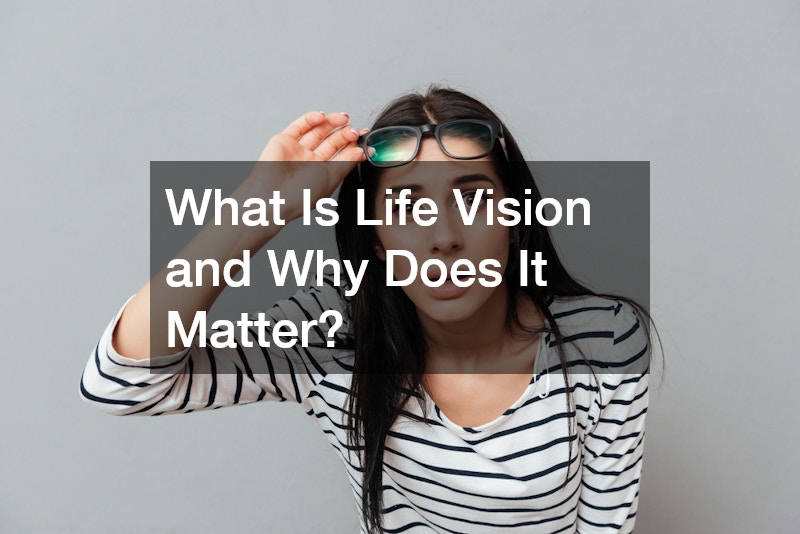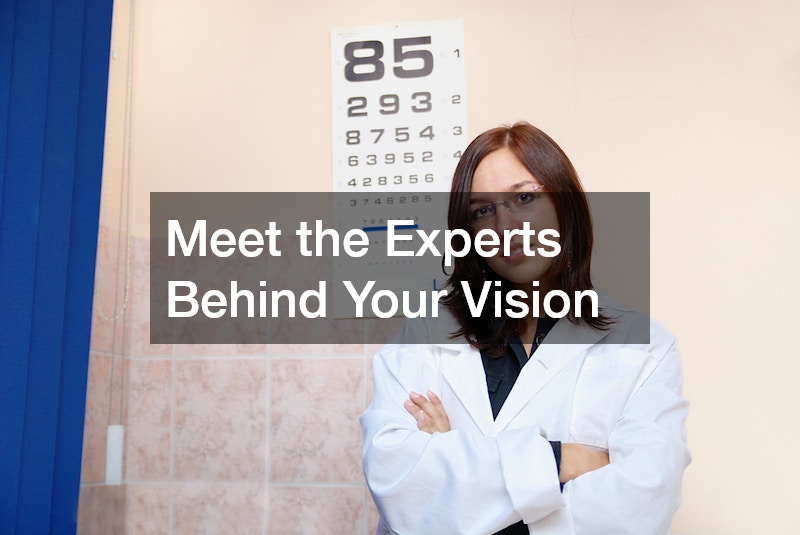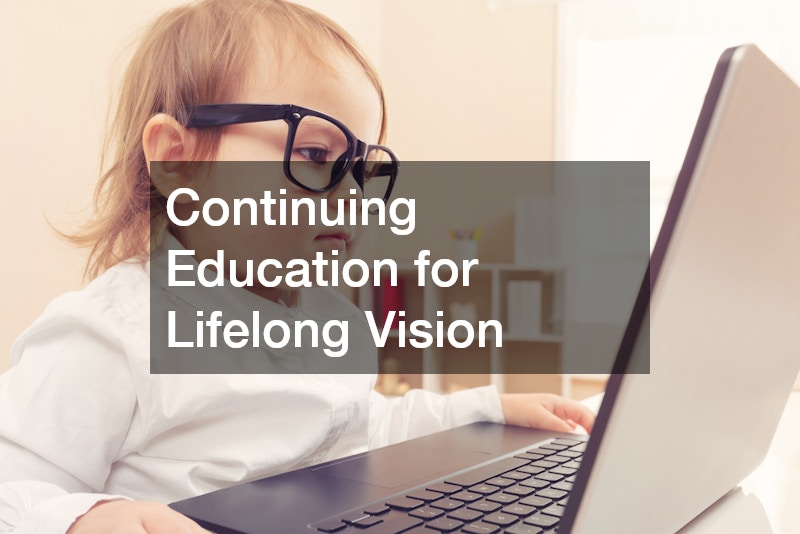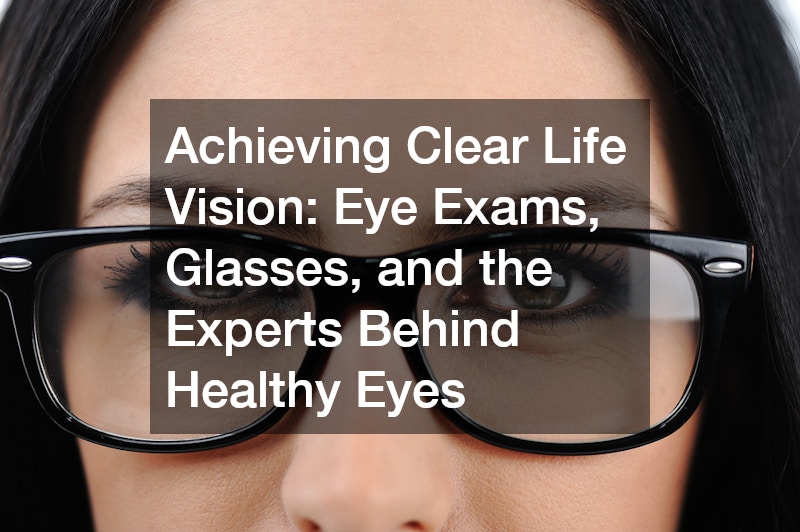Our vision is central to how we experience the world, from reading a book to watching our children grow, from navigating the workplace to enjoying the beauty of nature. Yet, many people overlook the importance of maintaining consistent eye health until they begin experiencing issues. The concept of “life vision” refers to more than just seeing clearly—it embodies a lifestyle that supports long-term visual wellness, clarity, and quality of life.
Clear vision enhances not only physical health but also cognitive function, emotional well-being, and our ability to engage fully in everyday activities. It empowers individuals to stay independent, connected, and confident. Whether you’re a young adult managing increased screen time or an older adult facing age-related changes in eyesight, understanding how to care for your eyes is a vital part of overall wellness.
In this article, we explore how routine eye exams, personalized glasses, and expert care from dedicated eye professionals form the foundation for achieving and maintaining clear life vision. From understanding the roles of optometrists, opticians, and other medical professionals to exploring advanced treatment options and lifestyle choices that support ocular health, we’ll provide a comprehensive guide for anyone seeking to protect or improve their vision.
We’ll also examine how environmental factors, genetic predispositions, and age-related changes affect our eyesight and what steps you can take to prevent or manage these influences. Whether you’re navigating dry eye discomfort, seeking the right optical care, or simply curious about the newest innovations in eyewear and eye health, this guide is designed to educate and empower you.
Your eyes deserve the same attention and care you would give to any other part of your body. Let’s take a deeper look at what it means to achieve a clear life vision—and how you can take proactive steps today to protect your sight for tomorrow.

What Is Life Vision and Why Does It Matter?
“Life vision” goes beyond simply having 20/20 eyesight. It represents a holistic approach to vision care that emphasizes lifelong visual clarity, health, and functional independence. Good vision is deeply tied to overall quality of life, influencing everything from daily comfort and mental focus to physical mobility and emotional resilience.
Eye health plays a key role in achieving life goals. Whether you’re driving, reading, working, or spending time with loved ones, visual acuity is essential. Poor vision can create barriers to productivity and joy, while clear vision enhances confidence and connection. Additionally, studies show that strong visual health contributes positively to mental wellness, helping to reduce risks of cognitive decline and emotional distress.
When you prioritize your vision, you’re also making a commitment to your long-term well-being and life satisfaction.
Why Regular Eye Exams Are Non-Negotiable
Routine eye exams are a critical component of preventative health care. Beyond checking your ability to read letters on a chart, a comprehensive eye exam can detect early signs of conditions like glaucoma, macular degeneration, diabetic retinopathy, and more—all of which can progress without noticeable symptoms.
Your eyes can also reveal broader health concerns. A local optometrist may detect signs of high blood pressure, diabetes, or other systemic issues before they become serious. Advancements in diagnostic technology have dramatically improved the accuracy and speed of eye exams, allowing for more detailed imaging and early intervention.
Most experts recommend a yearly exam, especially for adults over 40, contact lens wearers, or individuals with a family history of eye disease. Children and seniors often require more frequent checkups to manage developmental and age-related vision changes.
How Glasses Help You Achieve Life Vision
Properly prescribed glasses can transform your daily life. They do more than correct nearsightedness or farsightedness—they enhance focus, relieve eye strain, and contribute to greater comfort and efficiency in everything you do.
Today’s glasses are designed with both function and fashion in mind. Eyewear comes in a variety of styles, materials, and lens technologies to accommodate a range of visual needs and personal preferences. Whether you require progressive lenses, anti-reflective coatings, or blue light filters, a professional optician can help you select frames and lenses that support your lifestyle.
Choosing glasses over contact lenses is a personal decision, often based on convenience, comfort, or visual requirements. Your local optometrist can guide you through the decision-making process, ensuring that your glasses align with your health and vision goals.

Meet the Experts Behind Your Vision
Vision care is rarely a solo effort—it’s the result of collaboration among multiple experts, each playing a critical role in your eye health journey.
Optometrists are primary care providers for vision and eye health. They conduct comprehensive eye exams, diagnose vision issues, and prescribe corrective lenses. They are often the first professionals to detect signs of broader health concerns as well.
Ophthalmologists are medical doctors who specialize in eye surgery and advanced treatments for conditions like cataracts, glaucoma, and retinal diseases. When surgical or specialized care is needed, your optometrist may refer you to an ophthalmologist.
Opticians work closely with both optometrists and patients to ensure that glasses and other corrective devices are perfectly fitted and customized. Their attention to detail ensures that your glasses not only improve your sight but also feel comfortable and look great.
In some cases, a plastic surgeon may be involved in treating oculoplastic issues, such as eyelid malpositions or tumors that affect vision or eye comfort. Together, these medical professionals create a robust, patient-focused approach to vision care.
How Lifestyle Affects Your Vision
Your everyday habits play a significant role in maintaining eye health. A diet rich in antioxidants, omega-3 fatty acids, and key vitamins can protect against age-related conditions like macular degeneration. Leafy greens, carrots, and fish are all excellent choices for ocular nutrition.
Screen time is another major concern, especially in a digital world. Prolonged exposure to screens can lead to digital eye strain, headaches, and dry eyes. Many experts recommend following the 20-20-20 rule: every 20 minutes, look at something 20 feet away for 20 seconds to reduce eye fatigue.
Regular physical activity promotes healthy blood flow to the eyes, which is essential for keeping your retina and optic nerve functioning optimally. Meanwhile, poor sleep and high stress levels can lead to dry, irritated eyes and blurred vision. If dry eye symptoms persist, consulting with dry eye specialists can offer targeted treatment and long-term relief.
Advanced Treatments in Modern Eye Care
Modern eye care has seen remarkable innovations, many of which can significantly improve the quality of life. Laser eye surgery, including LASIK and PRK, offers long-term vision correction for people with refractive errors. These procedures have high success rates and are safer than ever before.
Cataract surgery now includes premium intraocular lenses that can reduce or eliminate the need for glasses altogether. For individuals with retinal conditions, new therapies such as injectable medications and gene-based treatments are helping preserve and even restore vision.
Innovations in glaucoma treatment and corneal transplant techniques also reflect the rapid progress in optical care. If you’re considering a procedure or facing a more serious diagnosis, a trusted medical professional can help you understand your options and guide you toward the most effective solution.

Protecting Your Vision in Every Environment
Environmental factors can significantly impact eye health. In workplaces that involve screen use or hazardous materials, protective eyewear and proper lighting are essential. For outdoor settings, UV-blocking sunglasses are vital to protecting your eyes from long-term sun damage.
Sports and recreational activities can also present risks to eye safety. Wearing sport-specific protective eyewear can prevent trauma and long-term damage. Even changing weather conditions, such as wind or dry air, can cause eye irritation, particularly for individuals with dry eye symptoms.
Children also benefit from early vision care. Protective eyewear for sports, regular exams, and screen time management all play a part in ensuring lifelong visual health starting at a young age.
Eye Health and Genetics
While lifestyle choices, diet, and environmental exposure significantly influence eye health, genetics also plays a substantial and sometimes overlooked role. Many eye conditions are inherited, meaning that if a parent or grandparent had a particular issue, there’s an increased likelihood that it could be passed down through generations. Understanding your family’s eye health history is an essential step in protecting your vision and planning long-term care.
Some of the most common hereditary eye conditions include glaucoma, age-related macular degeneration, retinitis pigmentosa, and certain types of cataracts. These conditions often have no symptoms in their early stages, making regular screenings even more critical for those with a known family history. For example, individuals with a genetic predisposition to glaucoma may not experience noticeable symptoms until significant vision loss has occurred, but early detection through an eye exam can help preserve vision through proper management and treatment.
Emerging genetic testing options are giving both patients and eye care professionals more tools to address hereditary risks proactively. These tests can identify genetic markers associated with specific diseases, allowing for personalized treatment plans, earlier intervention, and, in some cases, preventative therapies. While genetic testing is not yet standard for every patient, it can be an invaluable resource for those with a strong family history or signs of inherited conditions.
Furthermore, researchers are making exciting strides in gene therapy, particularly for conditions like Leber congenital amaurosis and certain forms of retinitis pigmentosa. These advancements offer hope for treatments that go beyond symptom management to correct or replace faulty genes, potentially.
It’s also worth noting that genetic risks do not exist in a vacuum—lifestyle factors can either mitigate or exacerbate genetic predispositions. For instance, individuals with a family history of macular degeneration may be able to reduce their risk through a diet high in leafy greens, antioxidants, and omega-3 fatty acids, as well as by avoiding smoking and managing UV exposure with proper eyewear.
Collaborating with your local optometrist or a specialized ophthalmologist can help you create a care plan tailored to both your genetics and your daily habits. By combining family history awareness with routine eye care and professional guidance, you can significantly increase your chances of maintaining healthy vision throughout your life.
Aging and Life Vision
Aging brings natural changes to vision, including reduced sharpness, difficulty focusing on close objects, and increased sensitivity to light. But with the right strategies and care, you can maintain a strong, clear vision throughout your later years.
Regular eye exams become increasingly important as you age. These checkups can detect cataracts, glaucoma, and age-related macular degeneration in their early stages, making treatments more effective. Nutrition, hydration, and avoiding tobacco use are all ways to support healthy aging eyes.
New assistive technologies—from high-contrast reading tools to magnifying devices—help seniors maintain independence and quality of life even if some visual decline occurs.

Continuing Education for Lifelong Vision
Maintaining a life vision also involves staying informed. There are countless reliable resources available, from websites run by the American Academy of Ophthalmology to interactive platforms provided by vision care providers.
Community programs and local workshops offer in-person learning and services, while telemedicine makes it easier than ever to connect with your optometrist remotely. Books and professional publications also help patients understand conditions and treatments more clearly.
Support groups and online communities allow people to share experiences and advice, making eye health education more accessible and empowering.
A clear life vision is not achieved overnight, nor is it simply a matter of getting a pair of glasses when text on the page becomes blurry. It’s a lifelong journey that includes regular eye exams, collaboration with dedicated medical professionals, and ongoing education about how our habits and health choices affect our vision. Your eyes are a gateway to nearly every experience, emotion, and opportunity you encounter. They deserve proactive, intentional care.
By maintaining a strong relationship with a trusted local optometrist, keeping up with scheduled eye exams, and being aware of changes in your vision, you’re setting the foundation for a future of clarity and comfort. Whether you’re visiting dry eye specialists to address persistent discomfort, exploring new eyewear options that balance style and function, or seeking advice from an optician about lens types, each step supports a broader goal—preserving your ability to engage fully in life.
Moreover, the support of a collaborative network of eye care experts—from optometrists and ophthalmologists to plastic surgeons and other medical professionals—ensures that whether you’re managing everyday strain or facing more complex issues, you have the resources and guidance to stay ahead. Optical care today is about customization, technology, and whole-body health. It’s about understanding how nutrition, screen time, exercise, and sleep all play a role in keeping your eyes in optimal condition.
Ultimately, the journey to achieving a clear life vision is about more than medical appointments—it’s about self-awareness, informed decision-making, and a commitment to seeing your life clearly, in every sense of the word. No matter your age or stage in life, you have the power to take control of your visual health. And with the right experts by your side, that vision becomes more attainable—and sustainable—than ever.

